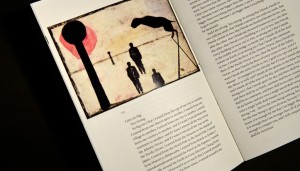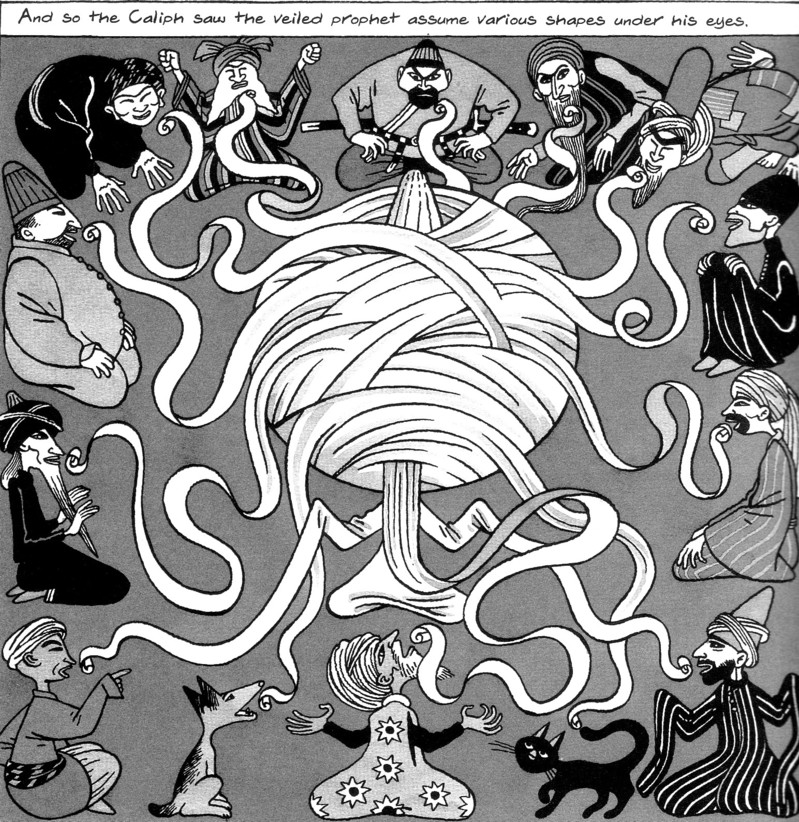These thoughts are a follow-on to the points I made in The Mythology of Laszlo Krasznahorkai and to a lesser extent in my comments on his Animalinside, which it seems will finally be released in the US in April by New Directions.
Krasznahorkai’s work tends to revolve around an intrusion onto order by chaos. In some of the early work like Satantango and The Melancholy of Resistance, the order takes a form of a recognizable socio-political situation: a small town, perhaps with echoes of the Communist era in it, though those echoes are never more than secondary associations. In other works, though, it just becomes what’s familiar by definition: the ideas and concepts we use to structure reality. The chaos comes as a pollutant. It’s some force that leaks into the known world and rips it to shreds. The world does recover, and I think this is because it must. Order will not disappear except with the death of every last human being. The chaos is an irruption.
Now, the order/chaos dichotomy is one that I do take fairly seriously. I think that it resists easy dismissal because, as Blumenberg says, it is primordial. The chaos is defined via negativa: it’s whatever our minds and concepts can’t get around. You can use other terms for it, like “infinite” or “other” or “transcendent,” but these are all misleading because they all imply (at least to me) a degree of access that, were it to exist, would domesticize the chaos and make it, well, non-chaotic, non-infinite, non-other, non-transcendent. Kierkegaard is always bizarre to read because he acts like he is on a first-name basis with the infinite, palling around with it and chatting over that crazy character Abraham. The same goes even moreso with Levinas: you can’t bow down to the Other in the way that he wants everyone to do so. This I think is one of his mechanisms for how the Other and the worldly tend to merge at certain points, when such a merging should not be possible, leading to twisty bits of logic like this:
Religion and religious parties do not necessarily coincide. Justice as the raison d’etre of the State: that is religion. It presupposes the high science of justice. The State of Israel will be religious because of the intelligence of its great books which it is not free to forget. It will be religious through the very action that establishes it as a State. It will be religious or it will not be at all.
Levinas, “The State of Israel and the Religion of Israel”
I do not find this objectionable; I merely find it incoherent.
But all this confusion has something to do with the falseness of Gnosticism. For any gnostic worth his salt is not going to come out and start talking about how much he (or she, but usually he) is a gnostic. Any real knowledge of that raw chaos, the way it is manifested far more honestly in Krasznahorkai’s work, causes insanity. By insanity I mean a form of disconnection from the world that no longer allows dialogue with the “order” of the known. Did Daniel Schreber have it? Did Antonin Artaud? (Louis Sass takes these two as studies in schizophrenia in his excellent book The Paradoxes of Delusion: Wittgenstein, Schreber, and the Schizophrenic Mind.)
Perhaps Cassandra is another case of this sort of intrusion, given more logical form as befits Greek culture, but there the joke is that she actually knew better. They thought she was insane, but really, she was right! It’s an inexact example. In Krasznahorkai’s cases, such as with Korin in War and War and the grandson in From the North by Hill, as well as (I think) the narrator in Animalinside, the chaos is dehumanizing in that it removes the person from the realm of the human. It overruns them with non-sense (not nonsense). In contrast, the gnostic sages that claim secret access to the Truth are false prophets, since they speak our language too well.
In contrast, I think the real sense of what that confrontation with chaos might feel like is partly captured by the ending of Tarkovsky’s Solaris, which starts off as beauty and then turns very very frightening, perfectly accompanied by the shift from Bach to Artemiev’s electronics:
(For all the differences between Tarkovsky and Stanislaw Lem, Lem’s focus on human knowledge encountering its limits and being forced to recognize those limits certainly provided a common ground between them, as much as Lem may have loathed admitting it. I wish Tarkovsky had made it clear that Kelvin’s gesture of falling to his knees is pointless, as good a reaction as any to the planet. Tarkovsky may not have thought that, though I know that Lem did. Bach is playing, the day is lovely, you feel in perfect harmony with the universe and in touch with God or whatever, and then you realize everything is wrong.)
And also with this excerpt from Kafka’s The Castle, which I quoted in the article and which still holds as an example of the announcement of that which is beyond you:
The receiver gave out a buzz of a kind that K. had never heard on a telephone. It was like the hum of countless children’s voices—but yet not a hum, the echo rather of voices singing at an infinite distance—blended by sheer impossibility into one high but resonant sound that vibrated on the ear as if it were trying to penetrate beyond mere hearing.
Franz Kafka, The Castle
So, likewise but without the religious apparatus, chaos appears in Krasznahorkai’s work as a threat, a breach upon what is safe and orderly, the violation of Hume’s riddle of induction that requires that we take our predictions to be reliable though we have no guarantee that they will be. It is an antagonist, like the Prince and the angry mobs he foments, or a corrupted trickster figure like Iremias in Satantango.
It spreads as well. I think of it a little like Ice-9, except that the process is reversible through the brutal reassertion of order. The infringing agent is destroyed in some manner or reassimilated into the greater orderly whole (remember, despite his seeming power, the Prince is a frail figure who needs the assistance of a factotum, among others). Iremias seems to display both aspects, both chaotic and order, since he rips up the social fabric of the town just as easily as he informs on the townspeople to the authorities, and I take this to be a sign of his malevolent madness. His mystical experiences are not total fabrications, but he is utterly unable to share them with the others; he merely inspires them with high-minded rhetoric to destroy their lives.
I do not think that Krasznahorkai paints an end or resolution to this sort of intrusion and countermeasure. He portrays it as far more imminent and pressing than most people are likely to experience, since we don’t usually suffer such irruptions, and when we do, there are carefully coded social mores and institutions to try to regulate and control them. This provides a feeling of safety and insulation, until it doesn’t. The chaos is something we live with.

